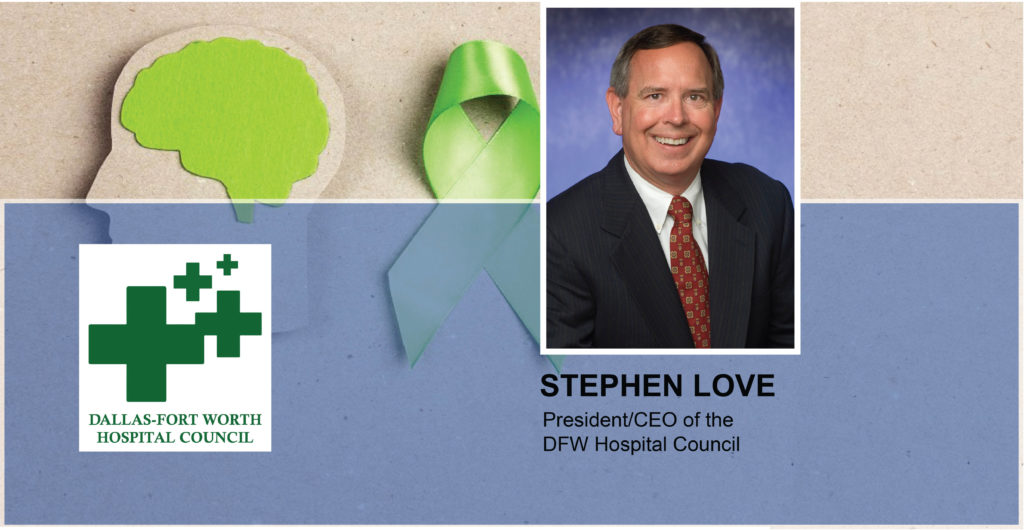
Blog by Stephen Love, President/CEO of the DFW Hospital Council
Many people define good health as a state of physical, mental and social well-being. It’s not just the absence of disease or illness. Four components in taking good care of our bodies and minds include a healthy diet, regular exercise, appropriate rest and taking time to unwind from daily routines.
Mental health is so important to our overall health. Depression increases the risk of chronic conditions such as heart disease and diabetes. Most of us understand the relationship between physical and mental health and yet, we still place a negative stigma on mental health treatment.
Glenn Close once wrote, “A society which can now speak openly and unabashedly about topics that were once unspeakable, still remains largely silent when it comes to mental illness.” Let’s remove the negative labels. We need to focus on the positive attributes of the person seeking treatment.
Mental health care needs to continue in primary care settings. Like any health care issue, we must avoid stigma and force the discussion towards an overall health assessment. With May being Mental Health Awareness Month, it’s a great opportunity for us to educate our communities about the potentially damaging prejudices surrounding treatment.
Our focus on mental health treatment is especially urgent for our children and adolescents. The Centers for Disease Control (CDC) reports that suicide is the second most frequent cause of death among our teens. For the past 14 months, our children have lived with anxiety due to the ongoing pandemic. They have routinely faced numerous issues magnified by isolation. Sadly, suicide attempts have increased.
We need to be a part of the solution as our young people represent our future – they need our support. Experts say communication is key and we all need to shed our preconceived notions and simply listen. We can state when things do not appear normal, emphasize our willingness to get involved and let them know help is available. Take the time to communicate openly with your children and family. Emphasize that you care about their well-being and you want to help no matter the problem.
I spoke recently with a child and adolescent psychiatrist who stated 70 percent of her patients have experienced some form of bullying. I thought back to my elementary school days and the bullies in the schoolyard. It’s a different world today, as our youth are potentially bullied around the clock due to social media. The pressures today for our youth are enormous. We all have a responsibility to help relieve those pressures and reduce teen suicides and attempted suicides.
As mentioned, this is Mental Health Awareness Month. But there needs to be an urgent personal focus 365 days a year. We need to educate our family and friends that individuals seeking mental health treatment should be embraced with compassion. They truly are seeking good health and we will all benefit from their efforts.
DFWHC Blog: Wellness and a Meaningful Existence
05/28/2021